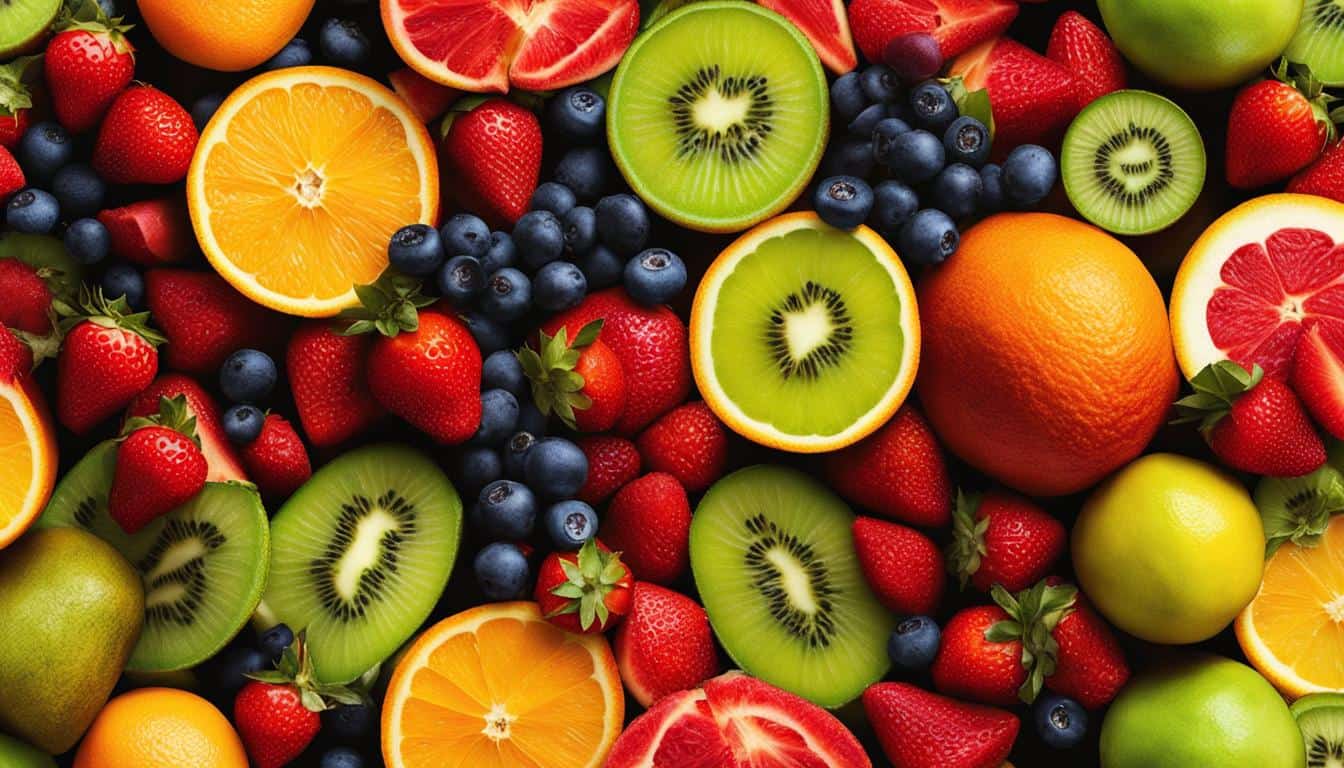Welcome to Your Healthy Friend! Today, I want to address a common question that many of us have: Does fruit have fat? When it comes to maintaining a healthy diet, understanding the fat content in different foods is essential. In this article, we will explore the truth about the fat content in fruits and shed light on which fruits are low in fat.
There is often a misconception that all fruits are high in fat, but that’s not the case. While some fruits do contain small amounts of fat, the majority are actually low in fat and can be enjoyed as part of a balanced diet. It’s important to debunk this myth and provide accurate information about fruit and fat.
So, join me as we dive into the fat content in different fruits, discover the health benefits of low-fat fruits, and explore creative ways to incorporate more fruits into your diet. By the end of this article, you’ll have a clear understanding of how fruits fit into a healthy lifestyle.
Key Takeaways:
- Fruits are generally low in fat, making them a healthy choice for any diet.
- Some fruits, like avocados and coconuts, have higher fat content compared to others.
- Including a variety of low-fat fruits in your diet provides essential vitamins, minerals, and antioxidants.
- Fruits can contribute to disease prevention, such as reducing the risk of cardiovascular diseases and certain cancers.
- Remember to consume fruits in moderation and as part of a balanced diet that includes other food groups.
The Myth About Fruit and Fat
There is a common misconception that all fruits are high in fat, but this is simply not true. In fact, the majority of fruits are low in fat and can be enjoyed as part of a healthy diet. It’s important to understand the truth about fruit and fat to make informed food choices.
Fruits are an essential component of a balanced diet and offer a wide range of health benefits. They are packed with essential vitamins, minerals, and antioxidants that support overall health and wellbeing. While some fruits do contain small amounts of fat, it’s important to note that the fat content is generally low, making fruit a nutrient-dense and low-fat food option.
By incorporating a variety of fruits into your diet, you can enjoy the nutritional benefits they provide without worrying about consuming excessive fat. From berries and oranges to apples and grapes, there are numerous low-fat fruit options to choose from. So don’t let the myth about fruit and fat discourage you from enjoying nature’s sweet delights.
| Fruit | Fat Content (per 100g) |
|---|---|
| Apple | 0.4g |
| Orange | 0.2g |
| Strawberries | 0.3g |
| Grapes | 0.1g |
| Watermelon | 0.2g |
As you can see from the table above, fruits like apples, oranges, strawberries, grapes, and watermelon have very low-fat content, making them excellent choices for those looking to maintain a low-fat diet. So next time you reach for a piece of fruit, rest assured that you’re making a healthy and low-fat choice.
Fat Content in Different Fruits
When it comes to the fat content in fruits, there is a wide variation depending on the type of fruit. While some fruits may have higher fat content, most fruits are low in fat and can be enjoyed as part of a healthy diet. Let’s take a look at some fruits with both high and low fat content.
Fruits with High Fat Content
Avocados and coconuts are two fruits that have relatively high fat content compared to other fruits. Avocados are known for their healthy monounsaturated fats, which can help support heart health. Coconuts, on the other hand, contain saturated fats but are also rich in beneficial medium-chain triglycerides (MCTs).
“Avocados and coconuts may be higher in fat compared to other fruits, but they offer unique nutritional benefits that make them a valuable addition to a well-rounded diet.” – Dr. Nutrition
Fruits with Low Fat Content
While avocados and coconuts have higher fat content, there are plenty of fruits that are low in fat. Berries, such as strawberries, blueberries, and raspberries, are excellent options for those looking for low-fat fruits packed with antioxidants. Oranges, apples, and grapes are also low in fat and provide essential vitamins and minerals.
Table: Fat Content in Different Fruits
| Fruit | Fat Content per 100g |
|---|---|
| Avocado | 14.7g |
| Coconut | 33.5g |
| Strawberries | 0.3g |
| Blueberries | 0.4g |
| Raspberries | 0.7g |
| Oranges | 0.1g |
| Apples | 0.4g |
| Grapes | 0.2g |
By choosing fruits with low fat content, you can enjoy their nutritional benefits without worrying about consuming excessive fat. Incorporating a variety of fruits into your diet is an excellent way to support your overall health and enjoy their natural sweetness and vibrant flavors.
The Health Benefits of Low-Fat Fruits
When it comes to maintaining a healthy diet, incorporating low-fat fruits can provide numerous health benefits. Not only are these fruits delicious and refreshing, but they also offer a range of essential vitamins, minerals, and antioxidants that support overall well-being.
One of the key benefits of low-fat fruits is their role in preventing chronic diseases. The vitamins, minerals, and antioxidants found in these fruits have been linked to a reduced risk of conditions such as heart disease, stroke, and certain types of cancer. By regularly consuming low-fat fruits, you can give your body the nutrients it needs to protect against these diseases and promote long-term health.
Additionally, low-fat fruits are an excellent source of dietary fiber. Fiber is essential for maintaining a healthy digestive system and can aid in weight management by promoting feelings of fullness. By incorporating low-fat fruits into your diet, you can increase your fiber intake and support digestive health.
| Fruit | Vitamin Content | Mineral Content | Antioxidant Content |
|---|---|---|---|
| Apple | High in vitamin C | Contains potassium | Rich in flavonoids |
| Berries | Rich in vitamin C and antioxidants | Contain manganese | High in anthocyanins |
| Orange | High in vitamin C and folate | Contains potassium | Rich in citric acid |
“Incorporating low-fat fruits into your diet is a simple and enjoyable way to support your overall health. With their abundance of vitamins, minerals, and antioxidants, these fruits offer a wide range of benefits that can contribute to a balanced diet and a healthier lifestyle.”
- Incorporate low-fat fruits into your daily meals and snacks.
- Try new recipes and experiment with different fruit combinations.
- Replace less healthy snacks with low-fat fruits for a nutritious and satisfying alternative.
- Make fruit smoothies or add fruits to salads, cereals, or yogurt for added flavor and nutrition.
By following these simple tips and including a variety of low-fat fruits in your diet, you can enjoy their health benefits while satisfying your taste buds. Remember to choose organic fruits whenever possible to minimize exposure to pesticides and maximize the nutritional value of your diet. Embrace the natural goodness of low-fat fruits and take a step towards a healthier lifestyle today!
The Importance of Variety

When it comes to incorporating fruits into your diet, variety is key. Including a diverse range of fruits ensures that you receive a wide array of nutrients and maximize the health benefits they provide. Different fruits contain unique combinations of vitamins, minerals, and phytochemicals, which are beneficial plant compounds.
By consuming fruits of various types and colors, you can support your overall health and well-being. For example, berries are rich in antioxidants that help protect against oxidative stress and inflammation, while citrus fruits like oranges and grapefruits provide a healthy dose of immune-boosting vitamin C.
Additionally, incorporating different types of fruits adds versatility to your meals and snacks. Whether you enjoy apples and peanut butter as a midday snack or add slices of kiwi to your morning yogurt, the options are endless. Experimenting with new fruits can also expand your palate and make healthy eating more enjoyable.
The Benefits of Eating a Variety of Fruits
1. Enhanced Nutrient Intake: Consuming a variety of fruits ensures that you obtain a wider range of essential vitamins, minerals, and antioxidants that promote optimal health.
2. Disease Prevention: Different fruits contain specific compounds that have been linked to a decreased risk of certain diseases. For example, consuming colorful fruits like blueberries and pomegranates can support brain health and reduce the risk of age-related cognitive decline.
3. Digestive Health: Fruits are a great source of dietary fiber, which aids in digestion and promotes regular bowel movements. Including a variety of fruits can help maintain a healthy gut and prevent digestive issues like constipation.
| Fruit | Main Nutrients | Health Benefits |
|---|---|---|
| Blueberries | Vitamin C, vitamin K, fiber, antioxidants | Improved brain health, reduced risk of heart disease, enhanced immune function |
| Kiwi | Vitamin C, vitamin E, potassium, fiber | Boosted immune system, improved digestion, lowered blood pressure |
| Pineapple | Vitamin C, manganese, bromelain | Reduced inflammation, improved digestion, enhanced immunity |
| Mango | Vitamin C, vitamin A, potassium, fiber | Eye health, improved digestion, strengthened immune system |
Fruits and Disease Prevention
Fruits play a vital role in disease prevention, offering a myriad of health benefits. Research suggests that consuming a variety of fruits can help reduce the risk of cardiovascular diseases, including heart attacks and strokes. Fruits rich in antioxidants, such as berries and citrus fruits, have been associated with a decreased risk of certain types of cancer.
According to a study published in the Journal of the American Heart Association, individuals who consumed a higher quantity of fruits had a lower risk of developing cardiovascular diseases, primarily due to their high content of vitamins, minerals, and antioxidants. The study also emphasized the importance of incorporating fruits with diverse colors and types to maximize the protective effects against diseases.
For example, leafy greens like spinach and kale are rich in folate and antioxidants, which contribute to heart health. Citrus fruits, such as oranges and grapefruits, are abundant in vitamin C and flavonoids, which have been linked to a lower risk of stroke. Cruciferous vegetables like broccoli and cauliflower contain sulforaphane, a compound known for its cancer-fighting properties.
By including a wide array of fruits in your diet, you can benefit from their disease-fighting properties and improve your overall health and well-being. Remember to consult with a healthcare professional or registered dietitian for personalized dietary advice.
How to Include More Fruits in Your Diet

Incorporating more fruits into your diet is a delicious and nutritious way to boost your overall health. Here are some tips for eating more fruits and creative ways to incorporate them into your meals:
- Keep fruit visible and accessible: Place a bowl of fresh fruits on your kitchen counter or desk, making it easy to grab a healthy snack instead of reaching for processed foods.
- Try new fruits and recipes: Explore different types of fruits that you haven’t tried before. You can also experiment with incorporating fruits into your favorite dishes, such as adding berries to your morning oatmeal or topping salads with sliced oranges.
- Replace less healthy snacks with fruits: Instead of reaching for sugary snacks or chips, opt for a piece of fruit. Fruits provide natural sweetness and a variety of nutrients to keep you satisfied and energized throughout the day.
- Blend fruits into smoothies and juices: If you’re not a fan of eating whole fruits, consider blending them into smoothies or juicing them. This can be a convenient way to consume a variety of fruits in one go.
Remember to choose a variety of fruits to ensure you’re getting a wide range of nutrients. Get creative and have fun with your fruit choices and recipes. By incorporating more fruits into your diet, you’ll be nourishing your body with essential vitamins, minerals, and antioxidants.
Quotes:
“Eating fruits is not only good for your body but also a delightful experience. Incorporating them into your meals can add freshness, vibrant colors, and a burst of flavors.” – Nutritionist Jane Smith
Now that you have these tips, it’s time to start enjoying the many benefits of fruits. From improved digestion to stronger immunity, these colorful gems can enhance your well-being. So, go ahead and get creative with your fruit choices. Your taste buds and your body will thank you!
Understanding Smoothies and Fruit Juices

Smoothies and fruit juices are popular beverage choices for many people seeking a refreshing and nutritious option. However, it’s important to be aware of their sugar content and make healthy choices. When fruits are blended or juiced, their natural sugars are released, increasing the overall sugar content. This can be a concern for those who are watching their sugar intake or looking to maintain stable blood sugar levels.
To make healthier choices, consider opting for smoothies and fruit juices with lower sugar content. Check the nutrition labels or ask for options that contain less added sugars. Additionally, it’s important to be mindful of portion sizes. While smoothies and fruit juices can be a convenient way to consume fruits, they can also pack in a significant amount of calories if consumed in excess.
When enjoying smoothies or fruit juices, it’s important to remember that they should not be the sole source of fruit in your diet. It’s still crucial to consume whole fruits to benefit from their fiber content and the act of chewing, which aids in digestion. A balanced approach is key, incorporating a variety of fruits, vegetables, whole grains, lean proteins, and healthy fats into your overall diet.
The Importance of Balance
Avoiding excess consumption of high-sugar smoothies and fruit juices is essential for maintaining a healthy diet. Instead, focus on incorporating a variety of low-sugar fruits into your meals and snacks. This way, you can enjoy the nutritional benefits of fruits without overloading on sugar. Additionally, remember to practice moderation and portion control when consuming smoothies and fruit juices. Savoring them as an occasional treat or sharing them with a friend can help you maintain a balanced and controlled approach to your fruit intake.
| Smoothie or Fruit Juice | Sugar Content (per 8 oz serving) |
|---|---|
| Strawberry-Banana Smoothie | 25 grams |
| Orange Juice | 21 grams |
| Kale and Spinach Green Juice | 5 grams |
| Mango-Pineapple Smoothie | 35 grams |
| Watermelon Juice | 10 grams |
Serving Sizes and Moderation

When it comes to incorporating fruits into your diet, it’s important to consider serving sizes and practice moderation. While fruits are packed with essential vitamins, minerals, and fiber, consuming them in excess can contribute to calorie intake and potentially disrupt your overall diet balance. By understanding portion control and practicing moderation, you can enjoy the benefits of fruits while maintaining a well-rounded eating plan.
Portion control for fruits
Whether you’re enjoying whole fruits or indulging in a refreshing smoothie, portion control is key. For whole fruits, the serving size typically ranges from one small fruit, such as a plum or kiwi, to half of a larger fruit, such as a grapefruit or banana.
As for smoothies, it’s important to be mindful of the serving sizes. Commercially available smoothies can often be larger than what is considered a single serving. To practice portion control, consider dividing the smoothie into smaller portions or sharing it with a friend. It’s also a good idea to opt for smoothies that are no larger than 150ml to keep your sugar and calorie intake in check.
“By being mindful of portion sizes and sharing your smoothie or saving some for later, you can enjoy fruits in a balanced and controlled manner.” – Your Healthy Friend
Studies have shown that practicing portion control can help individuals manage their weight and prevent overconsumption of calories. By controlling your fruit intake and incorporating it into a well-balanced diet, you can enjoy the nutritional benefits without going overboard on calories.
| Fruit | Serving Size (Approx.) |
|---|---|
| Apple | 1 medium (182g) |
| Banana | 1/2 large (118g) |
| Orange | 1 medium (154g) |
| Grapes | 1 cup (151g) |
Remember, while fruits are undoubtedly nutritious, they should be consumed in moderation as part of a well-rounded eating plan. By being mindful of serving sizes and incorporating fruits into your meals and snacks, you can reap the health benefits while maintaining a balanced diet. So go ahead and enjoy the natural sweetness and goodness of fruits, knowing that you’re practicing portion control and making responsible choices for your overall well-being.
Fruits as Part of a Balanced Diet

When it comes to maintaining a healthy diet, incorporating fruits into your meals is essential. Fruits provide a wide range of essential vitamins, minerals, and antioxidants that support overall health and well-being. By including a variety of fruits in your diet, you can ensure you’re getting diverse nutrients that are important for optimal nutrition.
Incorporating fruits into your meals can be done in a variety of ways. You can enjoy fruits as a standalone snack, add them to salads for a burst of flavor and nutrition, or include them in smoothies for a refreshing treat. The versatility of fruits allows you to experiment with different combinations and flavors, making mealtime even more enjoyable.
One of the key benefits of including fruits in your diet is the high fiber content they provide. Fiber is important for digestive health and can help keep you feeling fuller for longer periods, aiding in weight management. Additionally, the natural sugars found in fruits provide a healthier alternative to processed sugars found in many other foods. This helps satisfy your sweet cravings while still providing essential nutrients.
Remember that while fruits are an important part of a balanced diet, it’s crucial to incorporate other food groups as well. Whole grains, lean proteins, and healthy fats all play a role in maintaining optimal nutrition. By combining fruits with these foods, you can create a well-rounded eating plan that supports your overall health and provides the diverse nutrients your body needs.
Fruits in a Balanced Diet
| Fruit | Health Benefits |
|---|---|
| Blueberries | Rich in antioxidants that promote brain health and reduce the risk of chronic diseases |
| Oranges | Packed with vitamin C, which supports immune function and collagen production |
| Apples | Contain fiber and antioxidants that support heart health and aid in digestion |
| Bananas | Provide potassium, which is essential for proper muscle function and maintaining healthy blood pressure |
By incorporating a variety of fruits into your meals and snacks, you can enjoy the numerous health benefits they offer. Remember to choose fresh, whole fruits whenever possible and be mindful of portion sizes. Fruits are a delicious and nutritious addition to any diet and can help you maintain a balanced and healthy lifestyle.
Conclusion
In conclusion, fruits are a valuable addition to a healthy diet due to their low fat content and numerous health benefits. While some fruits like avocados and coconuts have higher fat content, the majority of fruits are naturally low in fat. By choosing fruits with low fat content, individuals can enjoy their nutritional value without worrying about consuming excessive fat.
Key takeaways from this discussion include the importance of variety in fruit consumption to ensure a wide range of nutrients. Different fruits contain unique combinations of vitamins, minerals, and phytochemicals, which contribute to overall health and well-being. Incorporating a variety of fruits into your diet can maximize the health benefits they offer.
It’s important to practice moderation when consuming fruits, whether in the form of smoothies or whole fruits. Being mindful of portion sizes and sharing or saving some for later can help maintain a balanced intake of fruits. Additionally, fruits should be consumed in conjunction with other food groups to create a well-rounded and supportive eating plan.
In summary, fruits are an excellent choice for those seeking a low-fat and nutritious diet. With their abundance of vitamins, minerals, and antioxidants, fruits can support overall health and contribute to disease prevention. So go ahead and incorporate a variety of fruits into your daily meals and snacks for a tasty and healthy lifestyle!
FAQ
Does fruit have fat?
While some fruits do contain small amounts of fat, the majority are low in fat and can be enjoyed as part of a healthy diet.
Are all fruits high in fat?
No, there is a misconception that all fruits are high in fat, but this is not true. Most fruits, such as berries, oranges, apples, and grapes, are low in fat.
What are the health benefits of low-fat fruits?
Low-fat fruits are rich in essential vitamins, minerals, and antioxidants, which can help protect against chronic diseases like heart disease, stroke, and certain types of cancer. They also promote digestive health and aid in weight management due to their high fiber content.
How can I include more fruits in my diet?
Some tips include keeping fruit visible and accessible, trying new fruits and recipes, and replacing less healthy snacks with fruit options. Incorporating fruits into your meals and snacks is a great way to increase your daily intake.
Are smoothies and fruit juices healthy?
While smoothies and fruit juices can be high in sugar, it’s important to be mindful of portion sizes and choose options with lower sugar content. Healthy beverage choices should include a balance of fruits and other food groups.
What are the serving sizes for smoothies?
Smoothies should be consumed in serving sizes of 150ml, which is smaller than many commercially available options. It’s important to practice moderation and be mindful of portion sizes.
Are fruits enough for a balanced diet?
While fruits are a crucial component of a healthy diet, they should be consumed alongside other food groups, such as whole grains, lean protein, and healthy fats, to ensure you receive all the necessary nutrients.
Are there specific fruits that can help prevent disease?
Research suggests that a diet rich in fruits can lower the risk of cardiovascular disease, including heart attacks and strokes. Certain fruits, such as leafy greens, citrus fruits, and cruciferous vegetables, have also been associated with a decreased risk of specific types of cancer.
How important is variety in fruits?
It’s essential to include a variety of fruits in your diet to ensure you get a wide range of nutrients. Different fruits contain unique combinations of vitamins, minerals, and phytochemicals, which are beneficial plant compounds.





Leave a Reply